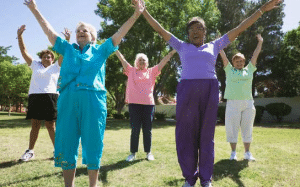Let’s Not Sit On It: Ageing and Exercise
Let’s Not Sit On It: Ageing and Exercise
How much do you move around each day? Many of us sit in front of a computer for hours on end and then top it off by it slumping in front of the TV during the evenings. On average we spend around 56 hours a week sitting down and this is doing far more damage to our health than we realise. Sitting down for excessively long periods of time has been linked to numerous health problems including:
- A higher risk of dying from heart disease or other illnesses including cancers
- Poorer mental health
- Higher blood pressure
- Increased risk of obesity and excess belly fat
- Higher levels of bad cholesterol
If you exercise regularly each week then you may be feeling pretty smug, but new studies have shown that won’t completely mitigate all those hours spent at your desk. What isn’t yet known is why sitting down for too long is associated with poor health.
Why Sitting Might Be so Bad for You
One possibility is that sitting down for long periods of time causes blood flow to become more sluggish and muscles burn less fat. This could increase the risk of high blood pressure and heart disease as well as other problems. It’s also been suggested that sitting down can make you hungrier when you’d think the opposite would be true. A study has shown that people who were active subsequently sat down for long periods of time didn’t experience a decrease in appetite.
What Can You Do about It?
You can purchase standing desks and an increasing number of workplaces are introducing this option. Experts suggest that you should get up and move around every half an hour if possible.
Ageing and Exercise
As people are generally living longer, there is increased interest in ways to stay healthy. The good news is that even if you have led a sedentary lifestyle for decades, taking up exercise in middle age or later can reduce the likelihood of becoming seriously ill as you become older.
While factors such as not smoking or drinking to excess are undoubtedly good for successful ageing, being physically active is particularly important. Physical activity can help reduce your risk of developing certain diseases and disabilities and it can be effective in helping some chronic conditions. Studies have shown people with diabetes, arthritis and heart disease can benefit from regular exercise. It can also be helpful for people who have difficulty walking, problems with their balance or high blood pressure.
The great thing is that it is often easy to incorporate more physical activity into your day and you don’t need special equipment or a fancy gym membership. Just taking the stairs, having a brisk walk or even doing some gardening will all help keep you active. The trick is to find something you enjoy doing and if you currently have a sedentary lifestyle to gradually increase your activity levels.


